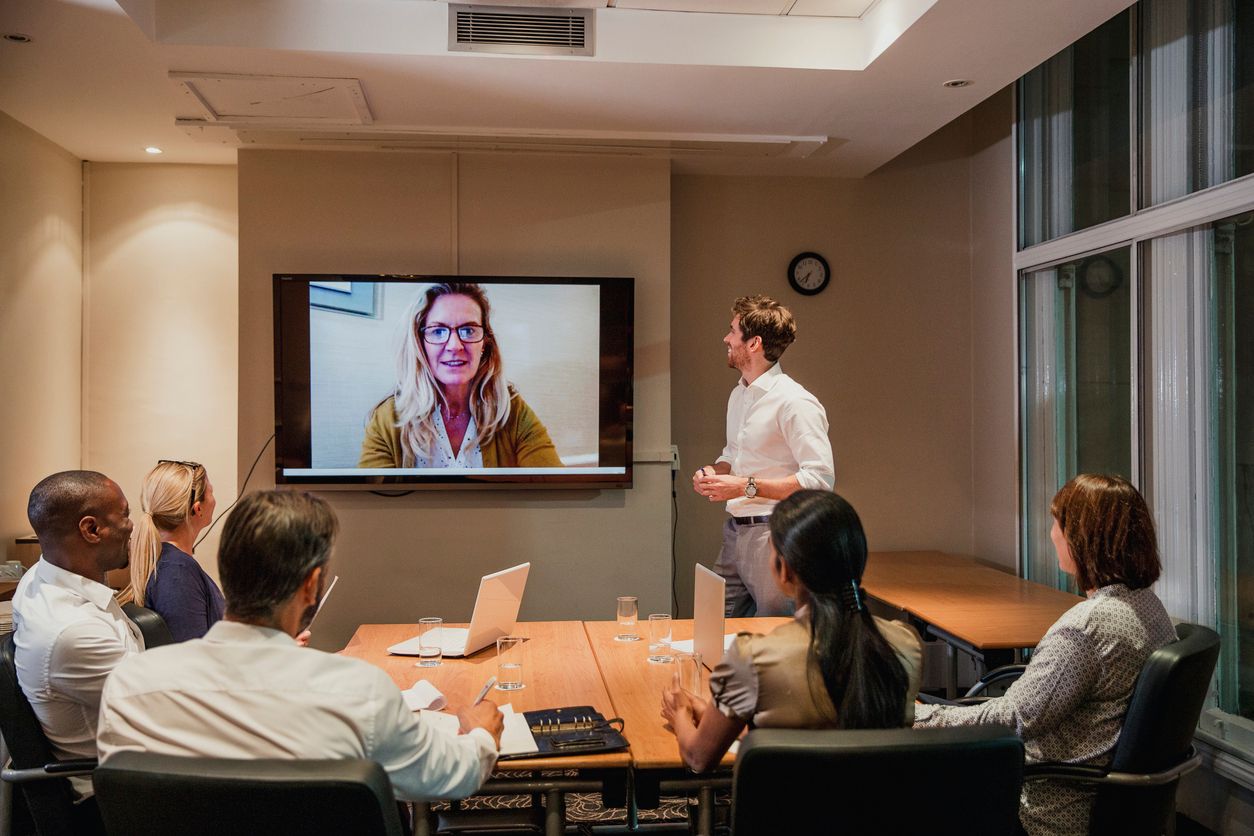Whether you're a seasoned hiring manager or it's your first time on the interviewing side of the desk, you're likely on the lookout for top interview questions to ask your candidates. Conducting an effective job interview takes time, effort, and lots of preparation, so you want your questions to pack a punch and give you want you need to make smarter hiring decisions.
The best questions should give you an insight into more than just a candidate's experience or education. They should also indicate what kind of soft-skills a candidate has, such as critical thinking or organisational skills, and whether or not they would be a good cultural fit in your workplace.
→ FREE DOWNLOAD: TOP INTERVIEW QUESTIONS GUIDE
So, to help you make the most of that interviewing time and find out everything you need to know about your potential employees on the other side of that desk, we've made our own handy little list.
This is our blog on the top job interview questions to ask a candidate!

Introductory questions:
Before diving straight into the interview, it's a good idea to start off with some initial introductions and pre-interview chitchat to make sure everybody is aware of what kind of structure the meeting will have and how long it should take.
That way, everybody has the opportunity to grab a drink of water or quickly go to the bathroom.
After the introductions, try and start off with some more light-hearted questions about the candidate themselves. You might already know a bit about them if you've already conducted a phone interview, but it's worth asking a few preliminary questions anyway to help ease your interviewee in.
'Tell me about yourself'
This is a very common interview question that probably every hiring team uses to open up the entire interview process. And the 'tell me about yourself' is a tried and tested classic for a reason. A candidate's answer about their work history or their professional passions gives you a much better understanding of them as a worker than scouring over their resume a hundred times ever could.
Starting out with this kind of open-ended question can also give you a clear indication of the interviewee's level of anxiety and can give them a moment to decompress by talking about themselves a bit.
'Do you have any hobbies?'
Again, this question helps a candidate relax and talk about something they're passionate about. Not to mention, hearing an interviewee discuss their passions and how they choose to fill their spare time will help you understand them more. You might find out that they are a very creative person, or maybe they are learning a new language.
Whilst their answer might have no bearing on the role at hand, it might reveal some of their soft skills, such as problem-solving skills, adaptability, communicative skills, or organisational skills.
'What attracted you to this role?'
Once you have a better grasp of the candidate's story and what type of person they are, it's time to get into the 'why' behind their application. This question is also a much better alternative to the 'why do you want to work for us?' classic, as many candidates apply for a job specifically because of the company itself.
How the candidate answers will let you know what's important to them in the job role. If they talk about the ins and outs of the job description, then they may be someone who is motivated by an exciting role. If they focus on what the role would mean to them and their career, you'll know that they are interested in professional development. They may even talk about how the company seems like a fun or positive place to work, in which case, company culture is probably very important to them.
Experience-based questions:
Whilst it's fairly normal for candidates to embellish their CV every now and again, a survey revealed that roughly 78% of the job seekers interviewed admitted to lying on their resume! Therefore, delving further into a candidate's former work experience in your questions is crucial.

'What did you do in your former role?'
They might have included a bullet point list outlining their main responsibilities on their CV, but this only allows so much detail. Let the candidate really show off their learned skills by asking them this one. They may give you examples of successful campaigns they worked on or a particular project they excelled in.
Also, by asking them to expand on their previous workplaces, you can listen to how they talk of their former or current employers.
'How did you get into _______?'
This question can be easily tailored to any profession, you just have to insert marketing, sales, graphic design, or whatever sector your role pertains to. Plus, it benefits from being both an experience-based and a personality question.
Listening to someone's professional journey and how they got into a certain field is usually very personal to them. It could also show you if they are a planner and their career is a result of strategic decision-making, or if they are someone who is willing to go with the flow and see where life takes them. Either way, you'll end up learning something interesting about the person sitting in front of you.
'Do you have experience using _______?'
If the role is dependent on an individual using a certain software or platform, asking about a candidate's experience with said systems is essential. It will either reveal that this candidate is not as experienced as you may require them to be, or it will prove that they definitely have the skill set you require for the position.
Plus, with around a third of people admitting to lying on their resume, asking questions such as these are imperative to making sure you're hiring someone that hits the essential criteria for the role.
FREE DOWNLOAD- TOP INTERVIEW QUESTIONS GUIDE →
Situational questions:
Job interviews are all about getting a better idea of what it would be like to work with a certain candidate. And whilst seeing your prospective hire in action is not possible until after their employment begins, situational interview questions are designed to help unveil a candidate's real life thought process and decision making.

'Have you ever had to deal with an intense workload and how did you manage it?'
Everybody has experienced stressful days at work where they've felt like they're never going to be able to get their tasks finished. But, it's usually in these moments that professionals grow the most.
Asking your applicant the chance to talk about how they perform under pressure and how they manage stress is invaluable to getting a more intimate understanding of their ability to adapt. If you run a fast-paced business, this adaptability and level-headedness is truly essential.
'How would you approach a task you've never completed before?'
Starting a new job can be a steep learning curve for some candidates. They are taking on a whole new workplace, potentially new software and platforms to work on, and maybe even a whole new management style.
But, some people struggle with change, or they find it hard to bend themselves to new processes. This question reveals if they are stuck in their ways of working or if they are willing to take on new working styles and new challenges.
'Tell me about a time that you made a mistake at work. What could you have done differently?'
Whilst discussing their mistakes and mishaps might go against their natural instincts in an interview, how they answer this question will tell you a lot about their capacity for learning. You want to know if they take accountability for their past errors or if they try to pass the blame off on their co-workers.
Admitting your failures shows humility and maturity, and being able to think back on what we could have done differently shows emotional and intellectual growth.
Soft skills-based questions:
As much as technical abilities and direct role-based skills should be prioritised in the hiring process, a candidate's soft skills are just as important. By asking them questions that assess their soft-skills, you can get a grasp of what kind of communicator, co-worker, and employee they will be.

'What is your greatest strength as an employee?'
Asking a candidate to address their positive qualities is not only an indicator of their confidence in their professional abilities, but it will also demonstrate their self-awareness as a whole. They may also bring up past examples of how they discovered what their strength was, giving you an indicator of how they would react under similar circumstances at your workplace.
Plus, this question is a hell of a lot better than its counterpart, 'what's your biggest weakness?'. It may be a common interview question but it's pointless. Nobody gives an honest answer because nobody wants to bare their worst trait to the person they want to hire them. Don't waste your breath and focus on what makes them great instead!
'What goals do you want to achieve in the next five years and how do you go about achieving them?'
The 'where do you see yourself in five years?' style question is definitely something of a classic. Mainly because it highlights a candidate's professional aspirations and motivations and how they set out their path to achieving them. Plus, it can determine whether or not this candidate will be a long-term hire or not.
Plus, their answer will reveal the big picture about where they see themselves at your company. If they have short term goals of working within a specific role and developing their skill set, that's great. But if they outline how they wish to develop their role within your company in the long term, that's even more beneficial.
'How would you define success?'
Asking someone what their idea of success is and how they would measure success in their life, reveals a lot about what type of person they are. Since this question is designed to get the candidate talking about what motivates them more than anything, pretty much any answer they give is a good answer.
A lot of candidates will say money or a certain title, whilst others might surprise you by saying happiness or something more personal. Whatever their answer, you'll be left understanding a lot more about them.
Admin questions:
'What are your salary requirements?'
The salary question is a divisive topic amid human resources, recruiters, and employers alike. Some think it's inappropriate to ask a candidate what salary they expect, whilst others see it as a prudent aspect of the role, and therefore highly relevant to the interview process.
However, the majority of time, this conversation has already been had so bringing it up for the purpose of clarity in an interview shouldn't be that big of a deal. Make sure you and the interviewee both get the chance to highlight what your salary expectations are, so as to not cause any issues further down the line.
'What kind of working situation would you prefer?'
In today's era of hybrid and remote working, you want to know that yours and your new hire's way of working will be a good match. So, this is a great question to ask candidates to see if they are more of an office-dwelling socialite, or if they are best left to get their work done in the privacy of their PJS.
It's important that both parties are transparent about what they are expecting and whether or not this will pose any issues further down the line.
'Do you have any questions for me?'
This classic question is a must for distinguishing the enthusiastic candidates from the less excited ones. The top candidates will likely have a wide range of questions to ask you about the logistics of everyday life in your workplace, whether their responsibilities will evolve over time, or even what kind of training programme you have in place.
However, those that ask about happy hour outings or staff parties might not be as enthused with the role in question and more about what extracurricular you'll offer to keep them interested in the job. Keep your eye out on interview red flags like this to make sure you’re making the smartest hiring decision.

The takeaway
To get the best answers out of your job candidates and make the right hire, you want to ask the best interview questions possible. From challenging their experience to assessing their communicational skills, the right questions will leave you with a better understanding of the individual you're interviewing and whether they'll be a good fit for your company.
So whether you use the questions provided above or you develop some of your own, we hope this guide has helped you make the most of your interviewing techniques and get the best results from your hiring process.



![How to Hire a Remote Software Developer [ Step-by-Step Guide ]](/content/images/2022/04/iStock-1163541557.jpg)
![9 Zoom Interview Questions to Ask Software Engineers [ Recruiter´s Guide ]](/content/images/2022/04/iStock-1319790212.jpg)
![What is the Average Software Developer Salary? [ For Startups ]](/content/images/2022/03/iStock-1017296544.jpg)
